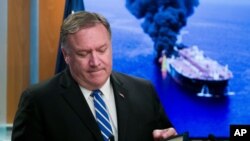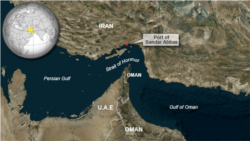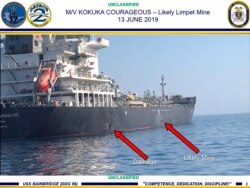The United States says it will "guarantee freedom of navigation" for shipping through the Strait of Hormuz through diplomatic talks or military intervention, contending again that it was "unmistakable" that Iran launched last week's attacks on two tankers sailing through the narrow passage.
"These were attacks by the Islamic Republic of Iran on commercial shipping on the freedom of navigation with the clear intent to deny transit through the Strait," Secretary of State Mike Pompeo told Fox News Sunday.
The top U.S. diplomat said the United States does not want war with Tehran, but it will ensure passage through the chokepoint that links the Persian Gulf and Gulf of Oman, a hook-shaped body of water through which as much as a third of the world's oil supply is shipped.
"The United States is going to make sure that we take all the actions necessary, diplomatic and otherwise, that achieve that outcome," he told Fox.
Pompeo told another Sunday news talk show, CBS News' Face the Nation, that military intervention would be employed if necessary.
Iran has rejected the U.S. accusation it is responsible for the attacks on the Norwegian and Japanese ships, one transporting oil and the other chemicals.
'Lots of evidence'
The president of the Japanese company operating the Kokuka Courageous tanker said he saw something fly toward the vessel and did not believe the ship was attacked by a mine or torpedo. But the U.S. Defense Department released a grainy video Friday showing what it said was an Iranian boat recovering an unexploded mine from the side of the ship.
Pompeo told Fox, "It's unmistakable what happened here," adding the United States "has lots of data, lots of evidence" that Iran was behind the attacks.
"The world will come to see much of it, but the American people should rest assured we have high confidence with respect to who conducted these attacks, as well as half a dozen other attacks throughout the world over the past 40 days," he said.
Nuclear deal
Pompeo said the U.S. is dedicated to keeping Iran from developing nuclear weapons, even as the United States withdrew from the 2015 international pact — which aimed at curbing Tehran's nuclear program in exchange for lifting economic sanctions against it.
The U.S. subsequently reimposed sanctions to curb Iran's overseas business transactions, but in recent days granted Iraq another 120-day waiver to continue to import Iranian natural gas to power its electrical grid.
U.S. President Donald Trump said Friday that if Iran blocks the Strait of Hormuz, "it's not going to be closed for long," but did not elaborate.
"They know it, and they've been told in very strong terms," Trump said. "We want to get them back at the table, if they want to go back," he said, referring to U.S. efforts to open bilateral negotiations on a new nuclear deal with Iran.
"I'm ready when they are, but whenever they're ready, it's OK," he told Fox News. "And in the meantime, I'm in no rush. I'm in no rush."






